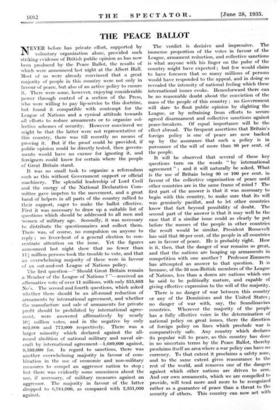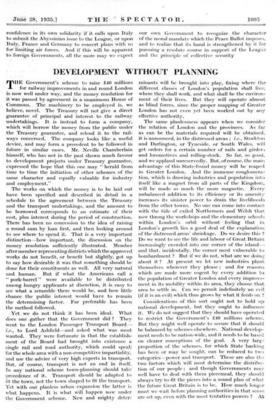THE PEACE BALLOT
NEVER before has private effort, supported by voluntary organization alone, provided such striking evidence of British public opinion as has now been produced by the Peace Ballot, the results of which were announced last night at the Albert Hall. Most of us were already convinced that a great majority of people in this country were not only in favour of peace, but also of an active policy to ensure it. There were some, however, enjoying considerable power through control of a section of the Press, who were willing to pay lip-service to this doctrine, but found it compatible with contempt for the League of Nations and a cynical attitude towards all efforts to reduce armaments or to organize col- lective schemes of security. However convinced we might be that the latter were not representative of this country, there was till recently no means of proving it. But if the proof could be provided, if public opinion could be directly tested, then govern- ments would have • no excuse for ignoring it, and foreigners could know for certain where the people of Great Britain stand.
It was no small task to organize a referendum such as this without Government support or official machinery. The splendid leadership of Lord Cecil and the energy of the National Declaration Com- mittee gave impetus to the movement, and a great band of helpers in all parts of the country rallied to their support, eager to make the ballot effective. First it was necessary to draw up a suitable list of questions which should be addressed to all men and women of military age. Secondly, it was necessary to distribute the questionnaires and collect them. There was, of course, no compulsion on anyone to reply ; no fever-heat of a general election to con- centrate attention on the issue. Yet the figures announced last night show that no fewer than 11 ?, million persons took the trouble to vote, and that an overwhelming majority of these were in favour of an out-and-out League of Nations policy.
The first question—" Should Great Britain remain a Member of the League of Nations ? "—received an
affirmative vote of over 11 millions, with only 355,883
No's. The second and fourth questions, which asked whether there should be an all-round reduction of armaments by international agreement, and whether the manufacture and sale of armaments for private profit should be prohibited by international agree- ment, were answered affirmatively by nearly 10 ?, million votes, and in the negative by only
862,000 and 775,000. respectively. There was a
larger minority which declared against the all- round abolition of national military and naval air-
craft by international agreement-1,689,000 against, 9,533,000 for. In regard to sanctions, there was another overwhelming majority in favour of com-
bination in the use of economic and non-military measures to compel an aggressor nation to stop ; but there was evidently some uneasiness about the
use, if necessary, of military measures against an aggressor. The majority in favour of the latter dropped to 6,784,000, as compared with 2,351,000 against. The verdict is decisive and impressive.. The immense proportion of the votes in favour of the
League, armament reduction, and collective sanctions is what anyone with his finger on the pulse of the country might have expected; but few would claim to have foreseen that so many millions of persons would have responded to the appeal, and in doing so revealed the intensity of national feeling which these international issues evoke. Henceforward there can be no reasonable doubt about the conviction of the mass of the people of this country ; no Government will dare to flout public opinion by slighting the League, or by refraining from efforts to secure agreed disarmament and collective sanctions against peace-breakers.. Of equal importance will be the effect abroad. The frequent assertions that Britain's foreign policy is one of peace are now backed
up by the assurance that such a policy is in pursuance of the will of more than 90 per cent. of the people.
It will be observed that several of these key questions turn on the words " by international agreement " ; and it will naturally be asked, What
is the use of Britain being 90 or 100 per cent. in favour of the collective organization of peace . until
other countries are in the same frame of mind ? The first part of the answer is that it was necessary to begin with this country, to make sure that its will was genuinely pacifist, and to let other countries know that fact beyond possibility of doubt. The second part of the answer is that it may well be the case that if a similar issue could as clearly be put before the masses of the people in other countries the result would be similar. President Roosevelt has said that 90 per cent. of the people in all countries are in favour of peace. He is probably right. How is it, then, that the danger of war remains so great, and that the nations are heaping up armaments in competition with one another ? Professor Zimmern has attempted an answer to that question. It - is because, of the 53 non-British members of the. League of Nations, less than a dozen are nations -which- can be said to be politically mature, and capable of giving effective expression to the will of the majority.
There is no danger of war between this country or any of the Dominions and the United States ; no danger of war with, say, the Scandinavian countries. Wherever the majority of the people has a- fully effective voice in the determination of national policy on . great issues, there the direction of foreign policy on lines which preclude war is comparatively safe. Any country which declares its popular will to peace, as this country has done in no uncertain terms by the Peace Ballot, thereby. proclaims itself an area where a war policy can have no currency. To that extent it proclaims a safety zone, and to the same extent gives reassurance to the rest of the world, and removes one of the dangers against which other nations are driven to arm. And our own armaments, which we are compelled to provide, will tend more and more to be recognized rather as a guarantee of peace than a threat to the security of others. This - country can now act with confidence in its own solidarity if it calls upon Italy to submit the Abyssinian issue to the League, or upon' Italy, France and Germany to concert plans with us for limiting air forces. And if this will be apparent to 'foreign Governments, all the more may we expect our own Government to recognize the character bf the moral mandate which the Peace Ballot imposes, and to realize that its hand is strengthened by it for pursuing a resolute course in support of the League and the principle of collective security







































 Previous page
Previous page